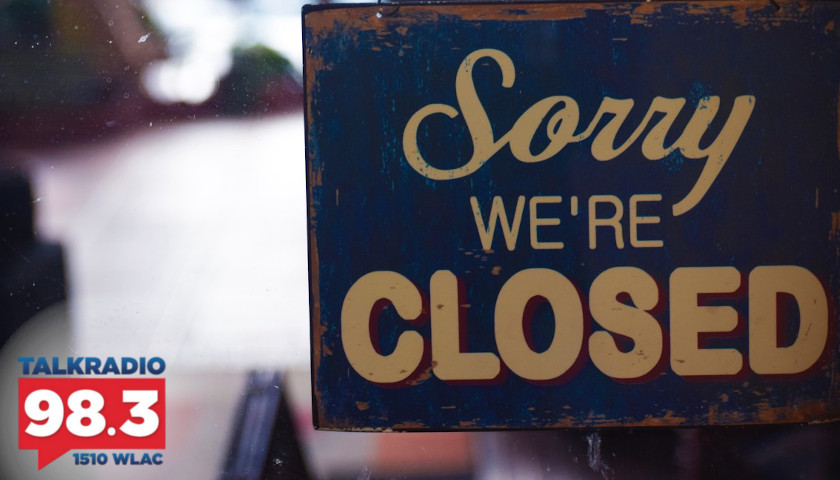Live from Nashville, Tennessee Wednesday morning on The Tennessee Star Report with Michael Patrick Leahy – broadcast on Nashville’s Talk Radio 98.3 and 1510 WLAC weekdays from 5:00 a.m. to 8:00 a.m.– Leahy and Carmichael discussed the economy and its effects caused by the coronavirus pandemic.
During the second hour, Carmichael addressed the issue of how small businesses will suffer for the next two to four weeks and how families will also have to be prudent in their expenses even with the proposed $1,000 stimulus proposed by the federal government.
Leahy: I am delighted that we are joined now by our good friend. The original all-star panelist Crom Carmichael. Good morning Crom.
Carmichael: Michael, how are you, sir?
Leahy: I am delighted to have you back. We miss ya!
Carmichael: Well, I took what turned out to be one of the shortest ski vacations that you could take in one day.
Leahy: I gotta hear about this.
Carmichael: We got out on Friday night. Everybody skied on Saturday. And we were at dinner Saturday night and found out that the governor of Colorado had shut down all the ski resorts effective immediately. (Leahy laughs)
So we scrambled and around got reservations and flew back to Nashville and got in on Sunday. So we arrived Friday night. I had a one-day ski trip. Actually a lot of people arrived on that Saturday only to find out that it was closed.
Leahy: Were you able to get skiing in on that one day?
Carmichael: Everybody else did.
Leahy: Your family did but…
Carmichael: I used to ski but I like to play golf and I love my knees. (Laughter) So for the first day, I wasn’t going to ski anyway. I don’t believe I would have skied this trip. I may have later but anyway it’s really interesting because all the people who work at the resort at Steamboat Springs all knew they were going to get laid off the next day.
Leahy: Wow! How were they reacting?
Carmichael: It was really very tough. It was very very tough. The people at the hotel. Everybody knew it was going like in three days just a ghost town. The retailers downtown, this week and the next two weeks are three of the biggest weeks of the year. And literally all of the tourists and customers will be gone.
Leahy: Not a lot of happy faces there among the retailers there I would imagine.
Carmichael: Then you look at the television and you saw downtown Paris, France, and nobody was there. It’s really quite something when the governments of the world tell everybody to stay home.
Leahy: It really is. You are a very thoughtful person. You read extensively. You think about things. You have certainly explained to this audience the basics of economics. Where do you see all of this going?
Carmichael: I’m making the assumption that the coronavirus, and we are pretty certain it’s a form of the flu. And I’ve got a friend of mine who follows two cities in the world. What’s going on in Singapore, and he follows what’s going on in South Korea.
And the reason he’s picked those two cities is that they are very very large. Approximately the same size. In many ways the same composition. The only difference between the two is that Singapore’s average temperature is 85 and South Korea’s is 45 degrees right now.
And the coronavirus is alive and well in South Korea and it’s barely moving in Singapore. So his takeaway is that just as other forms of flu it doesn’t like heat. So come May it ought to dissipate and die out for the season. And then what form it comes back in next fall or next winter is another question. But my sense of it is that in a few weeks we stop what we call now, “sheltering in place.”
Leahy: Social distancing. Sheltering in place. Yep.
Carmichael: Yeah. And the other question is going to be at some point we have to ask ourselves just how bad is this form of flu. Because of the number of people we’ve discussed this before, the number of people who die in the world every day is 150,000 people. So since the coronavirus has become part of the news 10 million people have died. And a few thousand of those have been from the coronavirus.
Leahy: Yeah. Now what’s interesting to me is the economic consequences of this. Let’s just say, my guess is I think you are right. I’m guessing. I’m not a doctor.
Carmichael: Neither am I.
Leahy: I don’t play one on the radio and I’m not a public health expert. Don’t play one on the radio. My guess is that this will peak in late May or early June in terms of the virus itself. How does economic recovery begin and how long does it take in your view?
Carmichael: My understanding is that the virus itself has peaked and is now heading down in China. It got up to like 80,000 cases over there. I think it’s now somewhere around 100,000 cases since the beginning.
This means that there have been fewer active cases now then it was two weeks ago. And I think China itself is beginning to recover. People are going back to work. And so I would expect in the United States that we’ll probably be going to be like this for another two to four weeks.
Leahy: Yeah.
Carmichael: It will be at least some time in the first part of April. At least. And likely to the middle of April. That’s for restaurants and small businesses it’s going to be really difficult.
Leahy: It’s brutal. It’s going to be brutal I think.
Carmichael: Yeah. But once it’s over I think we snap back. I think the federal government is in the process of pumping about a trillion dollars into the economy in a very very short period of time.
And of course, our economy is about I think a 22 trillion dollar economy annually. And so that’s a 1.7 or 1.8 trillion a month. And frankly, we’re probably operating at less than half of that. So pumping a trillion dollars sounds like a lot but it only makes up the difference for a month.
Leahy: One of the proposals out there Crom is to send a check to every American. I think that Mitt Romney said a thousand bucks. Looks like Mnuchin said one thousand bucks. Bernie Sanders said two thousand bucks a month. I think he wants it to be indefinitely. What’s your take on a one-time payment to every American?
Carmichael: Kind of the odd thing about it is let’s say everybody receives a check for a thousand dollars and a family of four, let’s just say they receive four thousand dollars. But they’ve been laid off.
Leahy: Yes.
Carmichael: So they might be able to make ends meet on that because they are not doing anything. So where do the four thousand dollars get spent? Part of it would be to pay the rent or the mortgage. So you continue to do that. Then you’d have money for food so you can still go to the grocery store. But I’m not sure you do much of anything else.
Leahy: I think that’s a good point.
Listen to the second hour:
– – –
Tune in weekdays from 5:00 – 8:00 a.m. to the Tennessee Star Report with Michael Patrick Leahy on Talk Radio 98.3 FM WLAC 1510. Listen online at iHeart Radio.





